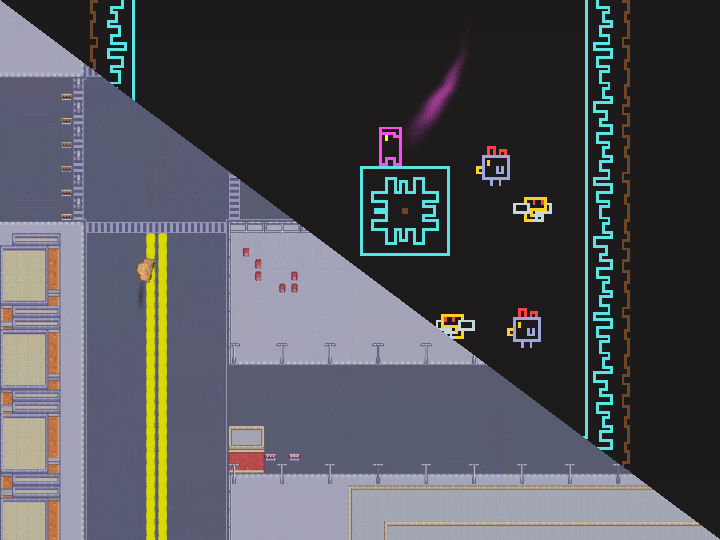Overview

I made two final games to finish out 2020. It’s an interesting pair of games. In my opinion, Birthday Taxi is my worst game and Pitfall Panic is my best. In this post I’ll focus on what went wrong in Birthday Taxi and what went well in Pitfall Panic.
Birthday Taxi
I wasn’t a huge fan of the theme “Birthday Gift”, my only idea was some kind of tiny slice of a Factorio-esque automation game where you build up a factory that produces birthday gifts. I was on the fence about it, knowing it would have been pretty work intensive and potentially difficult to complete in a week. One of my teammates suggested a Crazy Taxi type game where you delivered birthday gifts. I thought it would be simple to implement a car controller and other core gameplay features and implementing AI driving cars would be a fun challenge. However, it turns out it’s not simple to implement a solid car controller. Although I could very easily connect controls to forces on the car, it felt really difficult to find an intuitive control scheme and set of parameter values that felt good to drive with. Birthday Taxi “works” from a technical perspective but it’s difficult to control and therefore not very fun to play.
There were a few things that went wrong. I don’t really enjoy or have any experience with this type of game so I don’t have a good sense of what makes this type of game fun. I also don’t have a good sense of what makes an intuitive control scheme for this type of game. If I had more time, I probably would have researched games that execute this genre well and tried them out. A commenter recommended checking out GTA 1 as a good example of this genre, which Rockstar has made freely available for download. Another issue was a disconnect between the controller development and the map design. Originally, the map had roads that were much too thin and they’re probably still too thin in the final version. In my development sandbox level, I was developing the car controller in wider lanes without AI cars to get in your way. The car controller didn’t feel that bad in my testing sandbox but the problems became obviously clear when I switched over to the main level. A final problem worth mentioning is that the AI cars were even more time consuming than I thought, which left less time to polish and tweak the car controller in the context of the main level.
Though my comments up to this point have been almost exclusively negative, the game can be fun if you get into a good flow for a while. Unfortunately, the narrow streets and unpolished car controller make it unlikely that you’ll be able to maintain a smooth flow of driving for very long.
Pitfall Panic
After underestimating the complexity of Birthday Taxi, I wanted to have a really simple core mechanic. One of my teammates suggested a falling simulator game which fit the goal of ultra simplicity. The player needs to get to the bottom of sections of the pit before a timer runs out. Hitting enemies slows down your descent. At the end of each section you need to downgrade some aspect of that: your timer, your fall control, or how much you’re affected by enemies. The downgrade mechanic was included to satisfy the jam’s theme, “Downgrade”. It worked pretty well in the context of the game, giving the player control over how the game gets harder over time. With this small scope of game mechanics, I was able to finish the core game very quickly and have plenty of time left in the week.
The main reason I wanted to finish the core game early was to leave time for polish. Enemy animations, particle effects, color tweaking, and a nice end sequence are just a few examples of polish features that I had time to add. I also made sure every interaction in the game had pretty good visual feedback. I’m really happy with how it turned out. I think that polish is what makes a game good or makes a good game great.
We were ranked 6th out of 35 entries, which I was pretty happy with. We went up against some really great games. The winner, Downgrade, was a puzzle game with a clean retro aesthetic. Second place was Early Access, a really creative puzzle platformer that allows the player to downgrade to previous versions of the game. Also worth mentioning is Slower, which came in fourth place. It’s great and it did a better job of embracing polished simplicity than I did. If I had known creativity was going to be one of the grading criteria, I might have tried to think of a more creative game concept. Regardless, I think we did pretty well considering the strong competition. I played every single game and I look forward to incorporating some of the things I learned as both examples to strive towards and mistakes to avoid.
Looking Forward
There are a few things I want to do in 2021 before resuming game jams. First, I want to review all my jam games to try to learn more from them by considering them again with more experience. Second, I want to bolster certain game development skills by seeking out guides and other resources to learn from. Finally, I want to extract tech out of my jam games and package it cleanly for future re-use. I hope to get back to making new games in mid or late February.